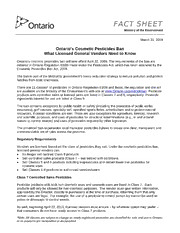
Fact sheet, Ontario's cosmetic pesticides ban : what licensed general vendors need to know PDF
Preview Fact sheet, Ontario's cosmetic pesticides ban : what licensed general vendors need to know
FACT SHEET Ministry of the Environment March 31, 2009 Ontario’s Cosmetic Pesticides Ban What Licensed General Vendors Need to Know Ontario’s cosmetic pesticides ban will take effect April 22, 2009. The requirements of the ban are detailed in Ontario Regulation 63/09 made under the Pesticides Act, which has been amended by the Cosmetic Pesticides Ban Act, 2008. The ban is part of the McGuinty government’s toxics reduction strategy to reduce pollution and protect families from toxic chemicals. There are 11 classes* of pesticides in Ontario Regulation 63/09 and these, the regulation and the act are available on the Ministry of the Environment’s web site at www.Ontario.ca/pesticideban. Pesticide products with controlled sales or banned sales are listed in Classes 7 and 8, respectively. Pesticide ingredients banned for use are listed in Class 9. The ban contains exceptions for public health or safety (including the protection of public works structures), golf courses, specialty turf, specified sports fields, arboriculture and to protect natural resources, if certain conditions are met. There are also exceptions for agriculture, forestry, research and scientific purposes, and uses of pesticides for structural exterminations (e.g., in and around homes to control insects) and uses of pesticides required by other legislation. The provincial ban supersedes local municipal pesticides bylaws to create one clear, transparent and understandable set of rules across the province. Regulatory Requirements Vendors are licensed based on the class of pesticides they sell. Under the cosmetic pesticides ban, licensed general vendors can: • No longer sell banned Class 8 products • Sell controlled sales products (Class 7 – see below) with conditions • Sell Classes 5 and 6 products including biopesticides and certain lower risk pesticides for cosmetic uses • Sell Classes 1-4 products to authorized vendors/users Class 7 Controlled Sales Pesticides Pesticide products with both non-cosmetic uses and cosmetic uses are listed in Class 7. Such products will only be allowed for non-cosmetic purposes. The vendor must give written information, approved by the Director, directly to purchasers at the time of purchase, informing them that only certain uses are legal. For example, the use of a pesticide to control poison ivy cannot be used on patios or driveways to control weeds. As well, beginning April 22, 2011, licensed vendors must ensure – by whatever option they prefer – that consumers do not have ready access to Class 7 products. *Note: All classes are subject to change as newly registered pesticides are classified for sale and use in Ontario, or as products are reclassified or declassified. Class 4 Product Sales to Farmers Farmers (i.e. an individual who owns an agricultural operation, or who operates an agricultural operation on a regular basis) can purchase and use a Class 4 pesticide. If the farmer is not a qualified farmer under s.43 of O.Reg 63/09, (i.e. does not have a growers certificate to prove that he or she has successfully completed the grower’s course approved by the Director) he or she must present either (i) a Farm Business Registration Number or (ii) photo identification and a signed self- declaration form indicating the pesticide will be used for his/her agricultural operation. The regulation requires that the farmers use only a self-declaration form that has been approved by the Director. The Director approved farmer self-declaration form will be available on the ministry’s website by April 22, 2009. Note that the farmer may retain the signed form for future purchases of Class 4 pesticides. Pesticide Storage and Disposal Vendors are responsible for the safe storage and disposal of banned pesticide products. Prior to disposal, consider asking the manufacturers (see product label for details) if unsold pesticides can be returned. Otherwise, unsold pesticides must be disposed of in accordance with O. Reg. 63/09 and Regulation 347 (General Waste Management) under the Environmental Protection Act. In Ontario, all pesticide wastes must be disposed of at a waste disposal facility that has been approved by the Ministry of the Environment. In addition, pesticide wastes can only be transported by a waste management company that has obtained the appropriate approvals from the Ministry of the Environment. Disposal of a pesticide by vendors is a multi-step process that requires classifying the waste and then determining the appropriate actions for disposal based on this classification. Questions regarding the proper disposal of pesticide waste should be directed to your local Ministry of the Environment District Office (look in the Blue Pages in your telephone directory or see a listing on the ministry’s web site at www.ene.gov.on.ca/en/about/org/index.php#4). Compliance and Enforcement The ministry manages its approach to compliance and enforcement through education and outreach, inspections, response to incidents, voluntary abatement, orders, tickets and prosecutions. In the case of the pesticides ban, the ministry will focus its initial efforts on education when responding to reports of suspected non-compliance. Questions or non-compliance reports should be directed to a ministry district office during regular business hours (look in the Blue Pages in your telephone directory or see a listing on the ministry’s web site at www.ene.gov.on.ca/en/about/org/index.php#4). After business hours call the ministry’s Pollution Hotline at 1-866-MOE-TIPS (1-866-663-8477). For more information: Questions about the ban can be directed to the Ministry of the Environment’s Public Information Centre at 1-800-565-4923 or 416-325-4000. Several fact sheets are available on the ministry’s website for specific audiences, as well as a general fact sheet about the regulation and suggestions on caring for lawns and gardens with greener alternatives. 2
